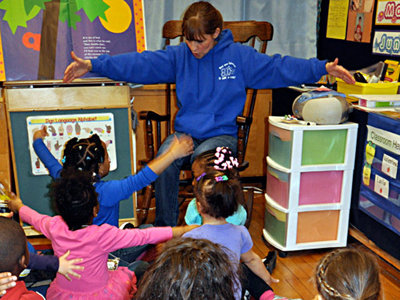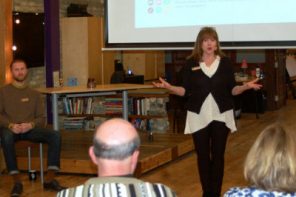Driving home from school yesterday, my child pointed out the window at one of the many day cares we pass on our daily routes.
“That’s kind of a depressing looking place,” he said, and I asked which place he meant. “That day care. Even the curtains in the windows are tattered.”
As any working parent knows, choosing a quality day care is important work. And it can be difficult work finding a place with a staff you can trust with your child’s care. Like a great school, a great day care must have an effective leader and quality teachers.
Sometimes, the condition of the drapes don’t tell the story. A clean, safe day care may not be doing much more than babysitting, herding kids like cats all day, and one with limited resources may let the curtains go while focusing on purchasing important curriculum materials.
As someone who has sat on the board of a day care, I know that even at an in-demand center, the budgets can be challenging. But, I suspect there are more than a few places where tattered window coverings are a perfect indicator of the mood inside.
So, I’ve been watching with interest as New York rolls out its first phase of $340 million statewide universal early childhood education plan this autumn, and as Chicago debates how it will get its version off the ground next year.
As is the case with anything, folks who back early childhood education can find supporting data, and foes can find data of their own. But as a supporter of public Montessori, which works in MPS to such a degree that Milwaukee NAACP has touted it as the best opportunity for children of color to receive a quality education in the district, I see the value of pre-K education at work every day.
The six public Montessoris, plus one MPS charter, are among the few schools — but not the only ones (and there are Head Start programs and 2- and 3-year-old Early Care at seven schools, too) — in the city to offer 3-year-old kindergarten and every day I see 3-year-olds excelling. They’re doing quality work and work that sets them up to grow in K4, K5 and beyond. They’re not sitting around alternating naps and “Teletubbies” episodes.
I know one kid (not mine) whose late-summer birthday means he started K3 just days after turning 3 and by second grade, he was off the charts in achievement in math.
Now, I know that’s anecdotal and that maybe he’d be doing that well even if he started school at 5, but the fact that he was able to get moving and feed his youthful thirst for knowledge surely didn’t hurt and I’d bet contributed to the fact that in third grade, his teacher is working with an upper grade teacher to provide this student with more challenging work.
If we’re looking for ways to boost achievement among Milwaukee’s kids, I think getting them into real, active, all-day learning environments earlier can provide a key.
It will encourage their natural 3-year-old curiosity.
It will help ingrain the idea of the importance of schooling early on.
It will give all kids a chance to access reading and writing and math concepts at an early age.
If there’s a belief that this pre-K advantage may begin to fade at third grade, then it sounds like part of any sensible universal pre-K plan should ensure that schools redouble efforts to at that level to keep kids on track.
Though I think that someday we will all see the value and bring universal early childhood education to the Badger State, Wisconsin may not yet be ready to commit to early childhood education for all.
It will be a big job not only funding such a program, but also rolling it out — just ask New York mayor Bill de Blasio — but we should watch other cities’ movements with a keen eye, because if we do it right, it will be worth the effort and the price tag.
By watching others, we can see what works and what doesn’t. We can learn the best ways to create and more smoothly implement universal pre-K that is effective and helps close the achievement gaps and boost the success of all children in Milwaukee and beyond.
Update: Since this post ran last week, Wisconsin Gov. Scott Walker declined to apply for millions of dollars in federal grants to help fund early childhood initiatives in the state.


 i evaluate to yes even if there's no image
i evaluate to yes even if there's no image  i evaluate to yes even if there's no image
i evaluate to yes even if there's no image  i evaluate to yes even if there's no image
i evaluate to yes even if there's no image  i evaluate to yes even if there's no image
i evaluate to yes even if there's no image  i evaluate to yes even if there's no image
i evaluate to yes even if there's no image  i evaluate to yes even if there's no image
i evaluate to yes even if there's no image